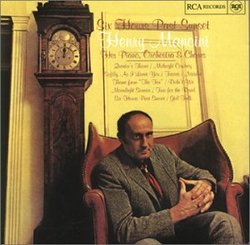Easy listening? Well...
wmkenlon | Mid-Atlantic USA | 08/02/2001
(4 out of 5 stars)
""Easy Listening" is an overused classification, a catch-all category to which our rock-centric world relegates almost any music not aggressive or simplistic enough for today's audiences. Henry Mancini is one of the artists thus pigeonholed who really worked in the genre of instrumental pop music. Some of his albums actually deserve to be called jazz; many others can indeed sit at the top of the genuine easy listening heap, relaxing old folks with the best of 'em. SIX HOURS PAST SUNSET is an album which at first appears to fall into the latter category, but personally, I just can't bring myself to put it there.The disc has more complexity than it's given credit for, and it's not always emotionally easy to take. The lyrics to the songs -- not heard in this recording -- all speak of sadness, emptiness, unfulfilled hopes and lost love; Mancini's arrangements speak of all those things with the same depth as a singer would -- possibly even more. The beat is often fairly brisk, but the mood is very much a dark one.The cover material was current in 1969: songs like "Girl Talk," "Traces" and "Didn't We?" were mainstays in the orchestral pop scene. "Softly As I Leave You" and Lalo Schifrin's beautiful theme from "The Fox" also fit the mood well. Among other tracks are "Quentin's Theme" and an adaptation of Beethoven's "Moonlight Sonata," neither of which quite mesh with the rest of the album. I've been known to skip these two occasionally, and they account for the missing fifth star in my rating.The Mancini originals include the title track, plus two of his then-recent film themes -- "Two For The Road" and the more obscure "Natalie." The latter is the melancholy waltz-tempo theme from the forgotten 1969 film "Me, Natalie"; the song is much more memorable than the movie. The most interesting track, and the one which best encapsulates this album's mood, is "Two For The Road," the bittersweet (mostly sweet) song from the 1967 picture of the same name. In this new version (mostly bitter) it sounds as if Mancini is sorting through the emotions of someone who has just suffered a terrible loss: it begins as a dreamy, rose-colored vision of the past, with a childlike celeste introduction and Ethmer Roten's summery flute painting a picture of joy long past. We begin to realize in a darkly moving segment for unaccompanied strings that this lost contentment is unlikely to be found again, and are finally brought back to cold reality by the despondent, dissonant conclusion. Mancini's orchestral artistry here is stunning, and while the other tracks may not tell this story as handily, they certainly fit the same general theme.Featured instrumentalists on the album include horn player Vincent De Rosa, taking the solo spotlight on "The Fox"; Dick Nash, adding interest to "Traces" with his valve trombone; and the legendary jazz bassist Ray Brown, improvising (with his usual aplomb) on "Girl Talk." SIX HOURS PAST SUNSET was Mancini's second full album as a pianist. As always, he tickles the ivories nicely, with proficiency and taste. But in my opinion, this is still very much an "arranger's album"; his piano-playing takes a back seat to his clean and frequently brilliant writing for strings, brass, and (on several tracks) a wordless choir. His writing here is not your average light, fluffy listening -- like many of Burt Bacharach's contemporaneous albums, it's much too full of pain for that."
Mancini Effect?
wmkenlon | 11/28/2000
(5 out of 5 stars)
"This was one of three Mancini albums I had on LP that I loved to listen to while doing homework in high school. It's great. I'm thrilled to find it on CD. By the way I graduated 17th out of 500 students. Maybe it's a Mancini Effect"


 Track Listings (11) - Disc #1
Track Listings (11) - Disc #1